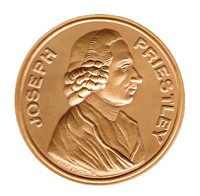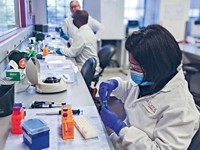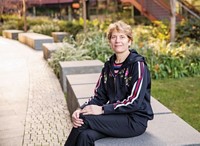×
CEN's 2020 Trailblazers
Frances Arnold: Directed-evolution pioneer
Carolyn Bertozzi: Glycoscience revolutionary
Samantha Du: Setting new standards for biotechs in Asia
Naomi Halas: Nanotech guru
Paula Hammond: Drug-delivery maven
Yamuna Krishnan: Developing DNA nanodevices to track and fight disease
Olga Malinkiewicz: Making good on the promise of perovskites
Mariana Matus: Combating the opioid epidemic with wastewater data
Kiran Mazumdar-Shaw: One of the world’s most powerful businesspeople
Erika Milczek: Replacing banned chemicals in consumer products
Amy Prieto: Building a better, safer battery
Sarah Richardson: Engineering wild microbes to produce useful chemicals
Amy Ripka: Taking a new approach to drugging neuro diseases
Cristina Sáenz de Pipaón: Trapping carbon dioxide with innovative membranes
Miranda Wang and Jeanny Yao: Aiming to make high-performance treasure from plastic trash
The women of CRISPR
Keeping up with Jennifer Doudna
Entrepreneurship 101: Jennifer Doudna’s top tips for success
Behind the scenes: Learn more about how we produced this issue
Advertisement
Grab your lab coat. Let's get started
Welcome!
Welcome!
Create an account below to get 6 C&EN articles per month, receive newsletters and more - all free.
It seems this is your first time logging in online. Please enter the following information to continue.
As an ACS member you automatically get access to this site. All we need is few more details to create your reading experience.
Not you? Sign in with a different account.
Not you? Sign in with a different account.
ERROR 1
ERROR 1
ERROR 2
ERROR 2
ERROR 2
ERROR 2
ERROR 2
Password and Confirm password must match.
If you have an ACS member number, please enter it here so we can link this account to your membership. (optional)
ERROR 2
ACS values your privacy. By submitting your information, you are gaining access to C&EN and subscribing to our weekly newsletter. We use the information you provide to make your reading experience better, and we will never sell your data to third party members.
Diagnostics
Amazing Women
Yamuna Krishnan’s goal: Find drugs for neurodegenerative diseases
Her company, Esya Labs, is developing DNA nanodevices that track drug responses, screen for new therapies, and more
by Celia Henry Arnaud
March 8, 2020
| A version of this story appeared in
Volume 98, Issue 9

Credit: Gretchen Ertl
When Yamuna Krishnan finished her postdoctoral training in the UK, she headed home to India, certain that her career would focus on fundamental science and never on entrepreneurship.
Vitals
➤ Titles: Chief science officer, Esya Labs, and professor of chemistry, University of Chicago
➤ Funding for Esya Labs: ~$400,000
➤ Investors of Esya Labs: Undisclosed individual investors from a friends-and-family round
Now a chemistry professor at the University of Chicago and the chief science officer of the start-up Esya Labs, she’s learned to never say never.
While working at the National Center for Biological Sciences in Bangalore, India, after her postdoc, Krishnan realized that the DNA-based fluorescence sensors she was designing could potentially be used to diagnose diseases. So she took the leap and moved to the University of Chicago, where she knew she could make connections to bring the sensors to patients.
Her group there has since developed DNA-based sensors to measure pH and chloride ions. The scientists use DNA as a “coat hanger” onto which they can add groups such as ion sensors and recognition elements to get the nanodevices inside cells.
Career Ladder: Snapshot
1980s
Yamuna Krishnan grows up in Chennai, India.
1993
She earns her bachelor’s degree in chemistry at the University of Madras, then goes on to earn her master’s and PhD at the Indian Institute of Science in Bangalore.
2001
Krishnan moves to the University of Cambridge for a postdoc with Shankar Balasubramanian, an inventor of the DNA-sequencing technology used by analysis firm Illumina. From her experiences there, Krishnan says she learned “what a completely transforming technology looks like.”
2005
She returns to India to work at the National Center for Biological Sciences. As the only organic chemist in an institute of biologists, she develops DNA-based sensors as a cross-cutting technology to answer questions her colleagues are chasing.
Today
As a chemistry professor at the University of Chicago, Krishnan cofounds Esya Labs in 2018 to commercialize her DNA sensors. Reflecting on her decision to launch Esya, Krishnan says it makes her “feel like a grad student handling a very difficult experiment. It’s daunting, it’s complex, but so exciting.”
These sensors can detect specific chemical signatures, like ion levels, inside the organelles of cells, especially lysosomes. The concentrations of ions are frequently off balance inside lysosomes in a number of diseases, including neurodegenerative diseases like Alzheimer’s. But there hasn’t been an easy way to measure them.
Seeing the promise of the nanodevices for diagnosing lysosomal storage diseases, graduate student Kasturi Chakraborty urged Krishnan to enter a business plan competition run by the University of Chicago’s Polsky Center for Entrepreneurship and Innovation. “We put together a very compelling science case, but our business case was not great at all,” Krishnan says, recalling their naivete about raising funds. “We didn’t win that competition for the simple reason that our business case was like the case of a 3-year-old.”
But while she was preparing for the competition, Krishnan visited Dhivya Venkat, a friend and serial entrepreneur working in finance in London. Krishnan practiced her pitch on Venkat, who said it needed a lot of work. After dinner and a bottle of wine, Venkat surprised Krishnan by saying she’d come aboard as CEO to make the start-up a reality.
“Everything changed,” Krishnan says. “From then, I understood what it is to have a professional businessperson manage very powerful technology.”
They founded Esya Labs in 2018, with Krishnan in Chicago and Venkat in London. They’ve raised initial funds from friends and family and are now looking for space to set up shop in the Boston area. They plan to open their next funding round this spring.
Esya has three areas of focus. The company is using its lysosomal ion-concentration technology to analyze tissue from clinical trial participants to determine whether patients respond to a drug and to divide the patient population into disease subtypes. It is also helping pharmaceutical firms screen for small molecules that target disease-related ion channels and transporter proteins in cells. And third, the company is working with a partner in India on diagnostics for rapid detection of bacteria and antibiotic resistance.
The experience of starting a company has been both frustrating and exciting, Krishnan says. But she thinks it’s positively affecting her day job as a professor, a position she has no plans to give up. She’s learned to frame her research in terms of the problems she’s trying to solve, not just in terms of cool technology.
Shankar Balasubramanian, Krishnan’s postdoc adviser at the University of Cambridge who has commercialized multiple DNA-related technologies, has followed her career since she left his lab. “It comes as no surprise that she is now launching a biotech company to develop and exploit her excellent scientific discoveries,” he says. “Some of the best biotech companies have been created by scientists with vision, originality, and considerable creative energy, and Yamuna is someone I would place in that class.”
And Krishnan may have caught the entrepreneurial bug. She already has an idea for another company, although she’s not ready to share details.
So much for never working in business.
To what behavior or personality trait do you most attribute your success?
"I’m intrinsically curious and love talking to young people and listening to their views, which have contributed greatly to where we are today."
Chemical & Engineering News
ISSN 0009-2347
Copyright © 2024 American Chemical Society





Join the conversation
Contact the reporter
Submit a Letter to the Editor for publication
Engage with us on Twitter